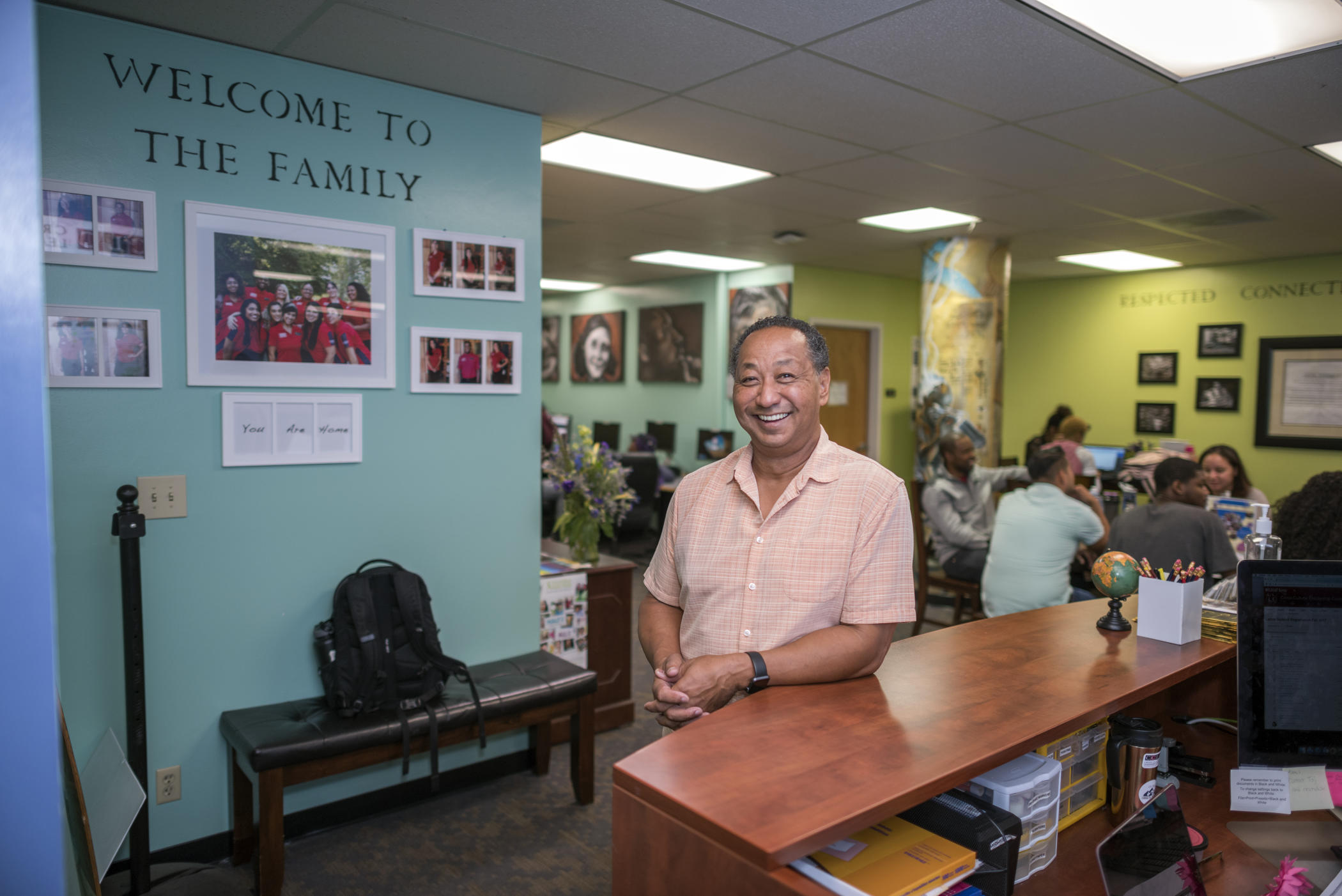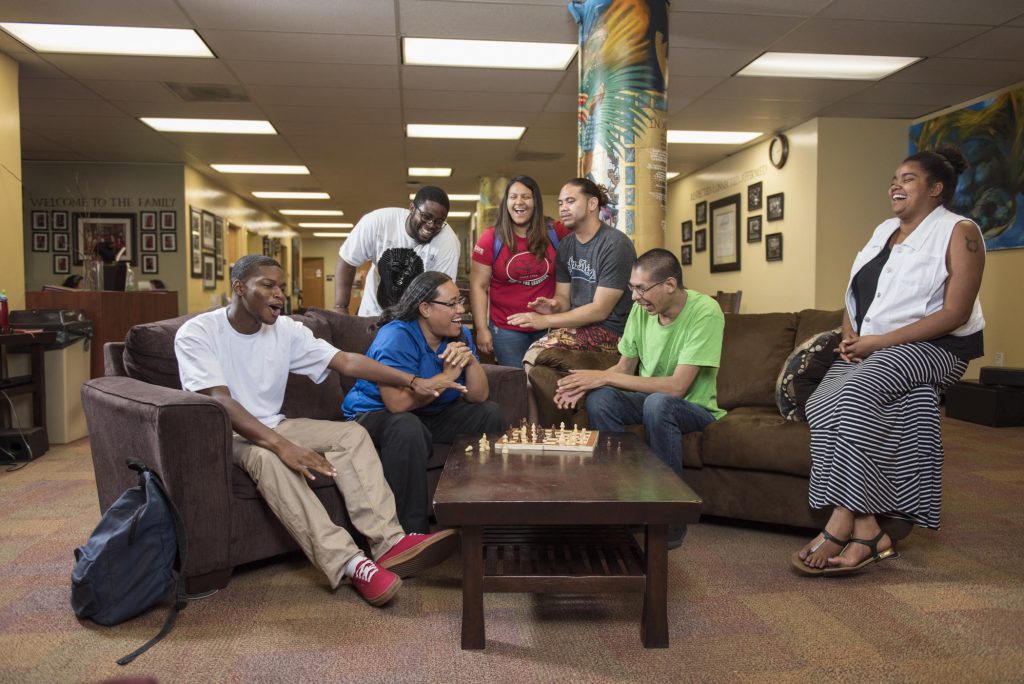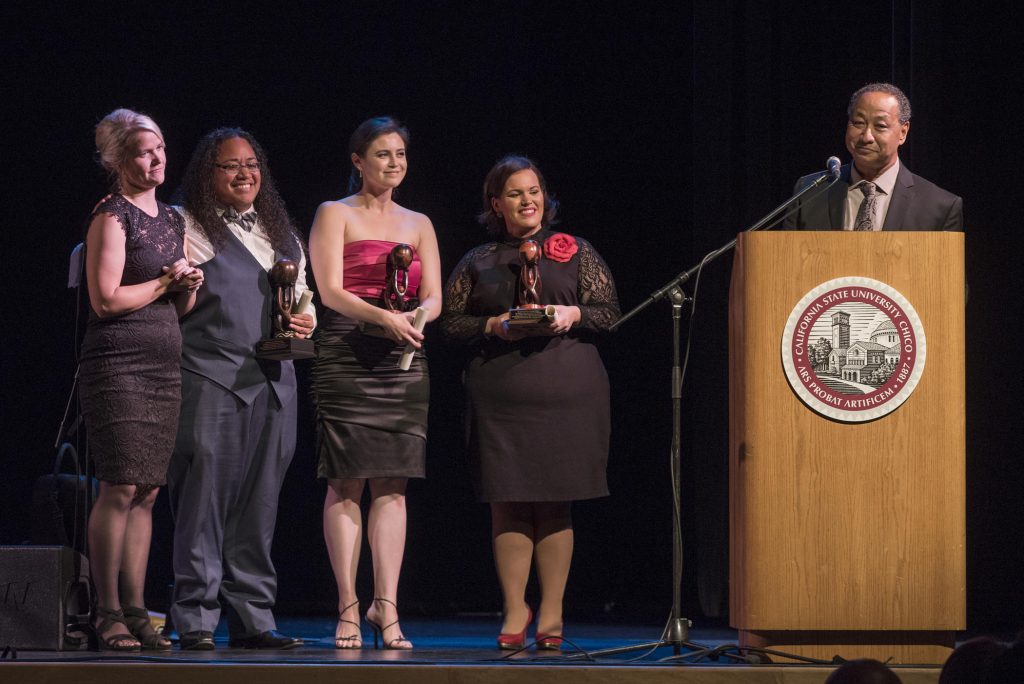Heart, Hope, and Hard Conversations: CCLC Says Goodbye to Its Founder after Celebrating 10 Years

Tucked inside the Meriam Library’s southeast corner is a room filled with something much larger than its footprint. On the nondescript door to Room 172, four letters loaded with hope announce to students that they’re home.
CCLC.
This is the Cross-Cultural Leadership Center, founded upon three basic principles: respect, connect, and affirm.
“If you do those three things, you create an environment of inclusion where everybody feels welcome,” said CCLC Director Charles “CC” Carter. “It’s taught to our staff and the people that are modeling that kind of behavior. And when you do that, the students follow that, and it changes the culture.”
In ways only visual art can do, beautiful and expressive acrylic and chalk murals adorn the walls (a portrait series called “Faces of Change” created from 2007–09 by College of Communication and Education Director of Development Erica Flores when she was a student), immediately signaling the inclusivity students can expect once they walk through the doors.
In September, the CCLC marked its 10-year anniversary with a gala in the Bell Memorial Union Auditorium, complete with acknowledgement of graduates and former and current staff, moving spoken word performances, and vibrant music and dancing.
And as the CCLC marches into its second decade, it will do so with a new leader. Carter is retiring, effective December 31, 2017.

While some students may never step foot in the CCLC, it’s a critical lifeline for others, as it welcomes students of all ethnic backgrounds, sexual orientations, and gender identities. Krystle Tonga, the CCLC’s assistant program manager, said its most valuable asset is it provides a place for students to connect with their campus.
“A lot of our students, when they walk into the classroom, they don’t see teachers that look like them, they don’t see students that look like them, and sometimes they’re the only student of color,” said Tonga (BS, Political Science; BA, Sociology, ’11), who has worked at the CCLC for seven years. “When they walk into the center, they say, ‘This is my space, this is my piece of Chico State.’ And it wasn’t always here.”
The history of the CCLC traces to 1980. Carter had just received his Chico State degree in social work. While he envisioned a future working with foster youth, the University instead hired him as its first coordinator for multicultural programs.
Carter’s multicultural program eventually paired up with a leadership initiative he also led, and both shared a space in the University Center. Necessary as they were, these two initiatives had a hard time coalescing at first.
“It was like, ‘OK, this doesn’t make any sense.’ We were doing things but it wasn’t fluid,” Carter said. “We weren’t even competing for resources, it was just different agendas.”
The two groups set out on a retreat and decided they wouldn’t return without a solution.
As Flores (BS, Agricultural Business, ’07) said during her speech at the CCLC Gala, the two groups had “honest, hard, and raw conversations. We envisioned the daring concept—the two could not only coexist but could become one. It wasn’t overnight, but the vision was painted, the mission statement written, and by fall of 2007, the doors opened as the Cross-Cultural Leadership Center.”

It’s safe to say that Carter, who is also the director of the University’s Student Life and Leadership department, has touched the lives of thousands of students. And that didn’t just happen. CCLC Program Director Katie Peterson said Carter emphasizes building relationships and prioritizes taking care of people.
“That’s distinctively different from other spaces, in that we’re all about the heart and the relationships,” Peterson said.
Forging trust with students who otherwise distrust authority figures can ultimately lead to tough, intense, and difficult conversations, whenever they need to take place.
“The institution is 8 to 5. Students are not 8 to 5, and the Center is not 8 to 5,” said Carter, noting his small but mighty staff are always available.
“We have students calling at 3 o’clock in the morning, telling us they’re done, they’re ready to take themselves out,” Carter said. “Our students call telling us, ‘My brother just got shot and killed, and I don’t know what to do,’ ‘My sister just got raped, I don’t know what to do.’ That kind of stuff happens 24/7 for us. Most people have no idea that’s happening in the lives of our students.”
The CCLC means different things to different students. It’s a hub for social activity, a place to do homework, or a room for deep, meaningful conversation. It also becomes the rallying point when critical incidents in the world and in the community directly impact Chico State students.
Over the last year, students, staff, and faculty have gathered in large numbers at the CCLC after the 2016 presidential election, after the deadly white nationalist rally in Charlottesville, and after President Donald Trump announced his administration was rescinding the Deferred Action for Childhood Arrivals (DACA) policy.
These gatherings help students vent their fears and frustrations, while often opening the door to more difficult conversations around inclusion and diversity. Those are conversations not everyone is willing to have. But Carter is, he says, because they’re absolutely imperative to understanding one another.
“Diversity is not black or white, it’s gray. And gray is messy and painful,” Carter said. “If you get through the gray and see the clearing on the other side, it is beautiful. But you have to get through the gray.”
Carter said the CCLC is more critical now than ever, and he sees its future role expanding as a beacon of hope and place of possibilities.
“I think you’ll see an increase in the ally-ship, not only in terms of students, but also more faculty and staff engaged in ways that mirror, complement, coordinate, and collaborate with the Center in ways that we have not seen before,” Carter said. “I think the CCLC will be in the middle of all of that.”
He also anticipates the staff increasing as student demand grows.
“I have two staff members that are taking on 99 percent of the workload. If we don’t find someone to come in and support them, it’s going to be problematic,” he said. “We do way too much work. But we do it because we love it.”
By the time the calendar flips to 2018, Carter will have exited through CCLC’s welcoming doors for the final time as director. Behind him, his staff say, he leaves a foundation he established for respect, connection, and affirmation to continue inside with its staff and students.
“To me, CC symbolizes hope and the future because he’s ingrained that into us,” Tonga said.
Upon his retirement, Carter established the Stone of Hope Scholarship, which will celebrate an emerging student leader who embodies the spirit of resilience. Support his legacy and future students by donating today.


